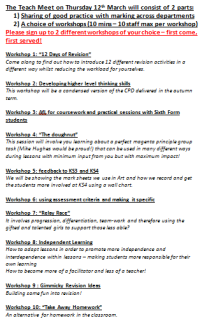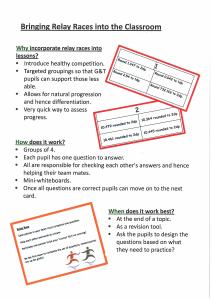This CPD session was a follow-up to the WCSF training we had at the end of last year and looked at taking some tips further to positively impact on the T&L of low ability learners at KS5.
The following strategies were shared:
– Comment-only marking: minimum input – maximum impact!
The amount of marking at KS5 is often very heavy yet so important in helping students understand how to improve. In particular, marking essays and writing detailed feedback can take forever! Here’s one simple way to remedy this whilst ensuring that students get the guidance they need to further improve.
1.Students list features of good/weak essays
2.Turn comments into ‘codes’
3.Use ‘codes’ to mark
4.Students re-write one passage in class
– Making connections:
This activity is based on the principle that if students have to do something with information (ie, reduce, connect, assemble, sequence it), then their understanding deepens.
Six degrees of separation is the theory that anyone on the planet can be connected to any other person on the planet through a chain of acquaintances that has no more than five intermediaries. The game “Six Degrees of Kevin Bacon” was invented as a play on the concept: the goal is to link any actor to Kevin Bacon through no more than six connections, where two actors are connected if they have appeared in a movie or commercial together.
– Retention, Analysis & Evaluation:
For some of our weaker students, remembering subject specific content itself can be a challenge. Try the following to boost their subject knowledge:
* ask students to keep a glossary of key terms
* encourage students to underline key terms in their work
* encourage students to “do something” with the information they take in (highlight something surprising… / highlight something interesting… / highlight something you agree with… / highlight something you disagree with… / highlight something you do not understand…)
* use post-it notes as a recap
* use quizzes or games to revise subject knowledge (see templates below)
To help with the skills of analysis and evaluation, give them examples, vocabulary and writing frames.
– Peer-assessment:
The following prompts can be really nice not only to give peer-assessment a bit of a makeover from the traditional 2 stars and a wish but also to refine and improve pupils’ learning.
* Write down four key words that your partner has used. Suggest one word that they could have used but didn’t.
* Write down the best sentence/quote from their work and explain why you chose it (ie what is good about it?).
* Write down one sentence/quote that doesn’t make sense to you (ie it lacks clarity or isn’t fully explained).
* Add one sentence which improves the essay.








